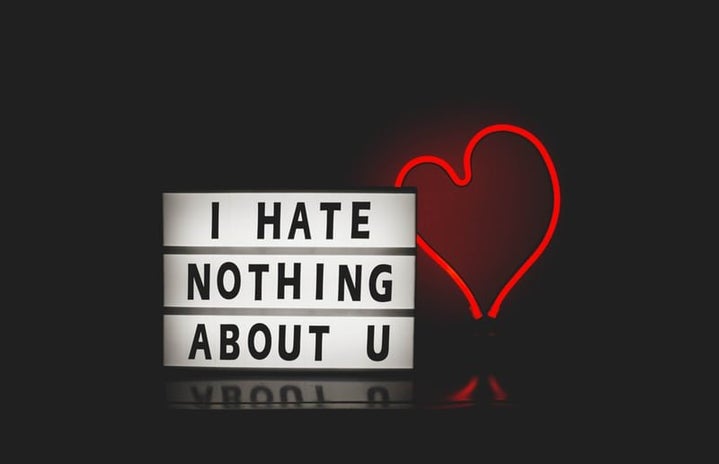There’s a chance you may have blinked and missed it, but starting back in September or October of last year, you may have seen the “red flag 🚩” meme circulating around your favorite social media explore pages, either as Tweet screenshots on Instagram or explained as a definitive list by creators left and right on TikTok. This trend was an opportunity for young people to share their subjective opinions that they automatically constitute as “red flags” in others—in other words, qualities that people may possess that should immediately signal to you that they’re nothing but bad news. Although most of the red flags I saw people dreaming up were mostly about significant others (men, in most cases), these warning signs were occasionally applied to potential friends as well.
I’ll admit, I enjoyed these memes at first: as you probably know in your own ways, people on the internet can be extremely creative, it never fails to amaze me every day. But the double-edged sword of the virtual world, within a few days’ time, as usual, turned something that was meant to be kept light-hearted and fun, meant to bring people laughs, into an unfortunate trend that was sugar-coated on top with a layer of bias, and actually, bullying, underneath. What started out as an opportunity to poke harmless fun at people for silly reasons has morphed into a legitimate reason for some people to turn a cold shoulder to others who aren’t exactly like them, just because of qualities they think are “wrong” for others to have. Everyone is allowed to have their own opinions about people, but when did judging others go too far?
It’s true, and I won’t argue against this, everyone is allowed to have their own opinions—if you have an “off” feeling about somebody, then there’s nothing wrong with trusting your gut and choosing a different path without them. However, in simple terms, the internet made it shamelessly popular to encourage people, practically overnight, to judge others based on how similar they are to themselves. As stupid as it may sound to me, and hopefully you, it quickly became a trend to hate on people with slightly different interests, as the definition of “red flag” is sifting through murky waters three months later. I hate to break it to the people who don’t want to hear this, but the people who like a different type of music than you, or like to go hiking more than you, or aren’t one of the zodiac signs you usually mesh with, may still have a lot to offer to your life that you’re missing out on.
Unfortunately, I’ve noticed that the red flag trend continuing into 2022 goes a bit deeper than that—it’s evolved into a bit of a classist form of stereotyping, with a large portion of people making these assumptions not realizing the potential damages of their quick opinions. What shouldn’t be a red flag, but has turned into one, is automatically disliking someone because of their material assets, or lack thereof. Comments that a potential friend of boyfriend is a red flag because “He drives a 2005 Honda Civic,” “Her texts conversations are green and not blue,” or “He still uses headphones with the wire” (all examples I’ve seen on Instagram, believe it or not), are examples of deeming a whole person as a red flag, not because there’s anything actually wrong with them, but because they don’t have exactly the same resources as you do, the ones you grew up with given to you as a right, rather than a privilege. This becomes especially concerning when this impression is being sent to young people who are glued to their social media accounts on all platforms, who are, inevitably, being exposed to this negativity and stereotyping, without a true understanding that some people have it easier than others—and that doesn’t make those who never had it easy “bad” people you should steer clear from.
So, I’ll sum it up as neatly as I can: red flags are not people’s personal preferences or things they can’t easily change. If you’ve ever heard the saying, “If they can’t fix it in five minutes, don’t bring it up at all,” that’s applicable to this meme—let’s not judge other people on their life’s situations that cannot be easily escaped and that we know nothing about. People want an excuse to hate on others these days at the snap of two fingers, and, honestly, this ain’t it. And it never will be.
As I’ve talked at great length about the two main points that are not red flags in others, whether they be a potential new gal pal or perhaps a boo just in time for Valentine’s Day, you may be left with wondering, “What is a red flag then? What should I look out for?” For that, I would say above all, look for signs and repeated patterns in someone’s character and behavior before making snap judgements. Pay attention to how someone approaches the important aspects of life, such as their motivations and goals, their relationship with the environment, and their closest personal relationships. Also, you may want to include their approach to political activism and awareness if that’s important to you as well. All in all, it’s best to look out for qualities in a person that are a true part of who they are and those that are likely to stick around with them for the long-term, as they’ll probably soon impact you too. Take an approach to evaluating if that person, past the small things, is someone that can healthily contribute to your life. If not, that’s when you can guiltlessly say goodbye.


